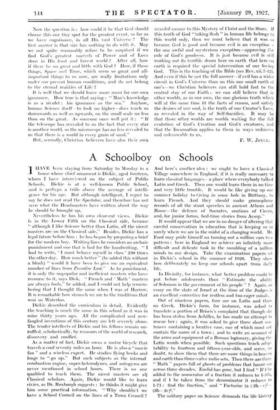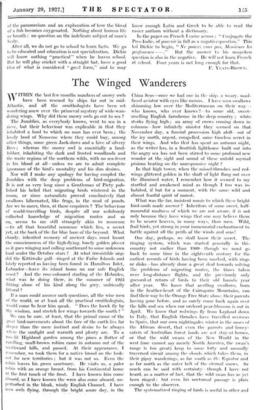A Schoolboy on Schools I. HAVE been staying from Saturday
to Monday in a house whose chief ornament is Dickie, aged fourteen, whom I have intervkwed on the subject of Public Schools. Dickie is at a well-known Public School, and is perhaps a trifle above the average of intelli- gence for his age. But although intelligent, I regret to say he does not read the Spectator, and therefore has not seen what the Headmasters have written about the way he should be brought up.
Nevertheless he has his own clear-cut views. Dickie is in the Lower Fifth on the Classical side, because " although I like Science better than Latin, all the nicest masters are on the Classical side." Besides, Dickie has a legal future before him : he has begun by preparing a brief for the modern boy. Writing lines he considers au archaic punishment and one that is bad for the handwriting. " I had to write, I must behave myself in class ' 250 times the other day. How much better " (he added this without a blush) " would it have been to give me an equivalent number of lines from Paradise Lost." As to punishment, it is only the unpopular and inefficient masters who- have recourse to it, says Dick. " French and Math ' masters are always fools,'' he added, and I could not help remem- bering that I thought the same when I was at Harrow. It is remarkable how staunch we arc to the traditions that won us Waterloo.
Dickie described the curriculum in detail. Evidently the teaching is much the same in this school as it was in mine thirty years ago. All the complicated and new- fangled inventions of this century are left severely alone. The tender intellects of Dickie and his fellows remain un- ruffled, scholastically, by rumours of the world of research, discovery and conflict.
As a matter of fact, Dickie owns a motor bicycle that travels a cool seventy miles an hour. He is also a "movie fan " and a wireless- expert. He studies flying books and longs to " go up." But such subjects as the internal combustion engine, super-heterodynes, and autogyros are never mentioned in school hours. There is no one qualified to teach them. The nicest masters are all Classical scholars. Again, Dickie would like to learn civics, as Dr. Roxburgh suggests : he thinks it might give him some practical information. " Why shouldn't we have a School Cmmeil on the lines of a Town Council ? And here's another idea : we ought to have a Classical Village somewhere in England, if it is really, necessary to learn classical languages—a place where everybody talked Latin and Greek. Then one would learn them in no time and very little trouble. It would be like giving up one summer holiday to ■Aving in some hole in Brittany, to learn French. And they should make gramophone records of all the stunt speeches in ancient Athens and Rome—the defence of Socrates, orations of Cicero, and, for junior forms, bed-time stories from Aesop."
It would appear that we are in no danger of altering that careful conservatism in education that is keeping us so surely where we are in the midst of a changing world. Mr. Ford may pride himself on turning out a million cars to a pattern : here in England we achieve an infinitely more difficult and delicate task in the moulding of a million minds to one design. Take the examination papers set in Diekie's school in the summer of 1926. They show how deliberately we keep our schools apart from daily life.
In Divinity, for instance, what better problem could be put before adolescents than " Estimate the ability of Solomon in the government of his people " ? Again, an essay on the state of Israel at the time of the Judges k an excellent corrective for restless and too-eager minds.
Out of nineteen papers, four are on Latin and three on Greek. Dickic's form, for instance, was asked to translate a portion of Briseis's complaint that though she has been stolen from Achilles, he has made no attempt to rescue her ; again, it was asked to give three short sen- tences containing a locative case, one of which must not contain the name of a town ; and to write an account of the arms and-equipment of a Roman legionary, giving the Latin words when possible. Such questions teach adap- tability to fourteen and fifteen-year-olds, and serve, no doubt, to show them that there are more things in heaven and earth than three-valve radio sets. Then there are three " Math " papers full of ghosts of problems that haunt me across three decades. Euclid has gone, but Lfind ". If 1 be added to the numerator of a fraction it reduces to 1-5th, and if 1 be taken from the denominator it reduces to 1-71 : find the fraction," , and "Factorise (a +2b 7-02- (3b — 202."
The solitary paper on Science demands the life history of the paramecium and an explanation of how the blood of a fish becomes Oxygenated. Nothing about human life or breath : no question on the indelicate subject of man's body.
After all, we do not go to school to learn' facts. We go to be educated and education is not specialization. Dickie will know nothing "practical" when he leaves school. But he will play cricket with a "straight bat, have a good idea of what is considered "good form," and he may know enough Latin and Greek to be able to read the easier authors without a dictionary.
In the paper on French I came across " Conjugate the Pres-Indic. of pouroir in full as a negative question." This led Dickie to begin, " Ne pouvez 'eons pas, Messieurs les professeurs ." But the answer to his unspoken question is also in the negative. He Will not learn French at school. Four years is not long enough for that.
F. YEATS-BR OWX.







































 Previous page
Previous page